
Muhammad Ali vs. Joe Frazier III, billed as the Thrilla in Manila, was the third and final boxing match between undisputed champion Muhammad Ali, and former champion Joe Frazier, for the heavyweight championship of the world. The bout was conceded after fourteen rounds on October 1, 1975, at the Araneta Coliseum in Cubao, Quezon City, Philippines, located in Metro Manila. The venue was temporarily renamed the "Philippine Coliseum" for this match. Ali won by corner retirement (RTD) after Frazier's chief second, Eddie Futch, asked the referee to stop the fight after the 14th round. The contest's name is derived from Ali's rhyming boast that the fight would be "a killa and a thrilla and a chilla, when I get that gorilla in Manila."

Robert Wayne Foster was an American professional boxer who fought as a light heavyweight and heavyweight. He won the world light heavyweight title from Dick Tiger in 1968 via fourth-round knockout, and went on to defend the title fourteen times against thirteen different fighters in total from 1968 to 1974. Foster challenged Joe Frazier and Muhammad Ali during his career, but was knocked out by both. He was named to Ring's list of 100 Greatest Punchers of all time. He was also named to Ring's list of the 80 Best Fighters of the Last 80 Years, ranking at No. 55. He was inducted into the International Boxing Hall of Fame in the inaugural class of 1990.

Earnie Dee Shaver, best known as Earnie Shavers, was an American professional boxer who competed between 1969 and 1995. A two-time world heavyweight championship challenger, he is known as one of the hardest punchers in heavyweight boxing history. He scored 70 knockout wins, including 23 in the first round, for a 76.7% overall knockout rate.
Jerry Quarry, nicknamed "Irish" or "The Bellflower Bomber", was an American professional boxer. During the peak of his career from 1968 to 1971, Quarry was rated by The Ring magazine as the most popular fighter in the sport. His most famous bouts were against Muhammad Ali. He is regarded as being one of the best heavyweight boxers never to win a title. He beat former world heavyweight champion Floyd Patterson and top contenders Ron Lyle, Earnie Shavers, Brian London, Thad Spencer, Buster Mathis, Randy Neumann, Jack Bodell, Mac Foster and Eduardo Corletti. The damage he accumulated from lack of attention to defense against larger men at the top level, no head guard sparring, and attempted comebacks in 1977, 1983, and 1992 resulted in Quarry developing an unusually severe case of dementia pugilistica.
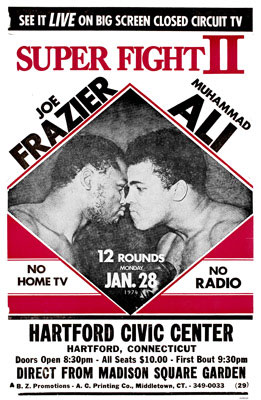
Muhammad Ali vs. Joe Frazier II, billed as Super Fight II, was a professional boxing match contested on January 28, 1974, for the NABF heavyweight title. The second of the three Ali–Frazier bouts, it took place at Madison Square Garden in New York City.
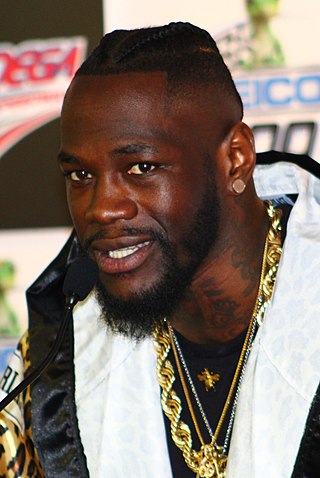
Deontay Leshun Wilder is an American professional boxer. He held the World Boxing Council (WBC) heavyweight title from 2015 to 2020. By winning the title, Wilder became the first American world heavyweight champion since 2007, which was the longest period of time in boxing history without an American heavyweight champion.

George Foreman vs. Joe Frazier II, billed as "Battle of the Gladiators", was a professional boxing match contested on June 15, 1976, for the NABF heavyweight championship.
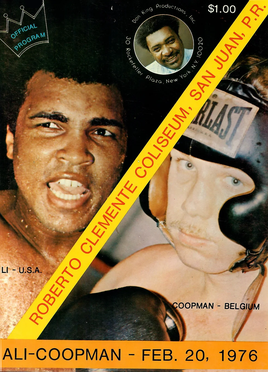
Muhammad Ali vs. Jean-Pierre Coopman was a professional boxing match contested on February 20, 1976, for the undisputed heavyweight championship. Ali won the fight after knocking out Coopman in the fifth round.

Muhammad Ali vs. Ron Lyle was a professional boxing match contested on May 16, 1975, for the undisputed heavyweight championship.

Muhammad Ali vs. Joe Bugner was a professional boxing match contested on February 14, 1973.
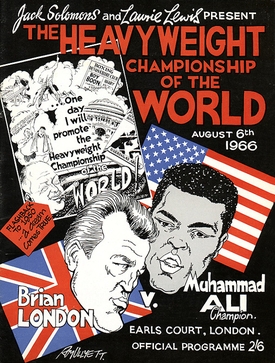
Muhammad Ali vs. Brian London was a professional boxing match contested on 6 August 1966, for the WBC, NYSAC, and The Ring heavyweight championship. The match took place at Earls Court Arena, London, England on 6 August 1966. It was scheduled for fifteen rounds. The match ended in the third round with Ali defeating London by KO.
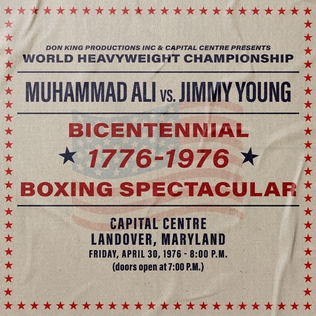
Muhammad Ali vs. Jimmy Young was a professional boxing match contested on April 30, 1976, for the undisputed heavyweight championship. Ali won the bout through a unanimous decision on points. This bout was aired live in primetime on ABC with Howard Cosell calling the action from the Capital Centre in Landover, Maryland.
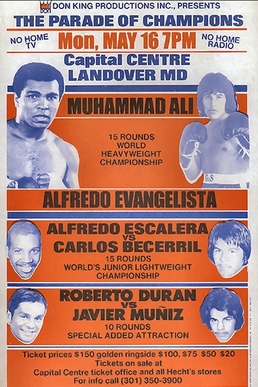
Muhammad Ali vs. Alfredo Evangelista, billed as The Parade of Champions, was a professional boxing match contested on May 16, 1977, for the undisputed heavyweight championship. The fight was held in the Capital Centre before a crowd of over 12,000 at the Capital Centre, along with a prime time broadcast on ABC.
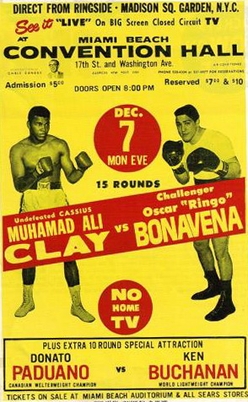
Muhammad Ali vs. Oscar Bonavena was a professional boxing match contested on December 7, 1970, for the NABF and Lineal heavyweight championship at Madison Square Garden in New York City on December 7, 1970.

Muhammad Ali vs. Ernie Terrell, billed as The Battle of Champions, was a professional boxing match contested on February 6, 1967, for the undisputed heavyweight championship. The fight went 15 rounds, with Ali winning through a unanimous decision.

Muhammad Ali vs. Cleveland Williams was a professional boxing match contested on November 14, 1966, for the WBC, NYSAC, and The Ring championship. Ali won the bout through a technical knockout in the third round.
Cassius Clay vs. Alex Miteff was a professional boxing match contested on October 7, 1961. Clay won the fight through a technical knockout when the referee stopped the fight in the sixth round. Miteff and Clay would feature in the 1962 film Requiem for a Heavyweight.

Evander Holyfield vs. John Ruiz II, billed as The Last Word, was a professional boxing match contested on March 3, 2001 for the WBA heavyweight championship.

Muhammad Ali was a boxer who mastered the rope-a-dope fighting technique. He is widely regarded by many boxing commentators and historians as the greatest heavyweight boxer of all time. Boxing magazine The Ring named him number one in a 1998 ranking of greatest heavyweights from all eras. In 1999, The Associated Press voted Ali the number one heavyweight of the 20th century.
Martin Bakole Ilunga is a Congolese professional boxer. He is the younger brother of former cruiserweight boxing world champion, Ilunga Makabu.

















